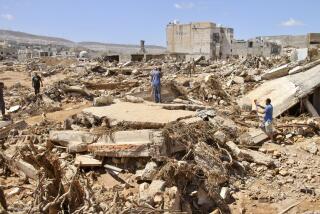Libyans in Talks With Victims’ Kin
- Share via
CAIRO — In another bid by Libya to buy its way out from under U.N. sanctions, a Libyan charity on Monday offered to increase payments to the families of those killed when a French airplane exploded over the Niger desert in 1989. The unspecified cash settlements were likely to mollify France and could clear the path for the lifting of international sanctions.
But Libya is still far from the political reinvention that analysts believe Moammar Kadafi is trying to foster by paying off the families of victims slain aboard the UTA flight and the Pan Am flight that blew up over Lockerbie, Scotland, in 1988.
Even if the U.N. sanctions are lifted, Libya will still feel the weight of a separate U.S. embargo. Despite reported pressure from oil companies, the Bush administration has said it isn’t ready to ponder easing the punishment of Libya.
Tripoli would need to show “tangible changes in behavior” -- such as giving up habitual meddling in divisive African disputes and abandoning ambitions to develop an unconventional weapons arsenal -- before relations could improve, a senior U.S. official said.
The Kadafi International Assn. for Charitable Organizations, headed by one of Kadafi’s sons, announced Monday that a private fund would provide an unknown sum of money to the families of the 170 people killed in the explosion of the French airplane.
The families said negotiations were continuing. French officials have said they would probably support a move to abolish the U.N. sanctions, provided that the families are satisfied.
The French were deeply angered in mid-August, when Libya promised payments as high as $10 million for each of the 270 victims of the bombing of Pan Am Flight 103. In an earlier agreement, Libya had paid the survivors of victims of the French flight $194,000 each.
Libya has never admitted to bombing the French plane, and analysts said the payoffs are probably as close as the regime will come. On Monday, the Kadafi charity continued to proclaim the innocence of six Libyans convicted in absentia of carrying out the attack. In an annual address Sunday celebrating the anniversary of his coup, Kadafi told his people the money was a humanitarian gesture.
But Libya appears eager to move beyond the long-contentious airplane explosions and resulting ostracism -- a measure of the anxiety creeping into undemocratic regimes in the wake of the invasion of Iraq.
There is a sense that falling out of U.S. favor has become more dangerous than ever, analysts said.
The example of Saddam Hussein, combined with the internal pressures of poverty, crumbling infrastructure and the reform-minded philosophies of his own children, has pushed Kadafi to garner favor with the West, said Mansour Kikhia, a political scientist at the University of Texas at San Antonio.
“Kadafi escaped this ‘axis of evil’ list only by the skin of his teeth,” Kikhia said. “So he said, ‘Well, I don’t want to end up like Saddam Hussein.’ ”
So far, the United States says the money isn’t enough. The Lockerbie settlement “relieves the suffering of some of the family members and also does apply the guilt where it does truly belong, and that’s on the shoulders of the government of Libya,” Deputy U.S. Secretary of State Richard L. Armitage told the Arab satellite television channel Al Jazeera on Aug. 22.
Experts say Libya’s weapons program is rudimentary compared with other “rogue” states that have been the cause of U.S. concern in recent years.
Analysts at the Carnegie Endowment for International Peace say the country has no nuclear weapons, and no stocks of nuclear-weapons-grade material, except at facilities that are subject to inspection by the International Atomic Energy Agency.
But Libya is believed to be interested in developing the capability to build its own chemical weapons. It’s also allegedly interested in a biological weapon, though it reportedly hasn’t done much more than basic research and development.
Libyans who fled the regime to live in exile bitterly decried the settlements Monday, arguing that the money isn’t Kadafi’s to spend. The massive cash payouts will punish the Libyan people by further depleting an already shaky economy, they said, and would forestall any serious judicial inquiries.
“What sort of justice is this?” said Suleiman Bouchuiguir, secretary-general of the Libyan League for Human Rights. “There is no aspirin in the hospitals, but we’re giving away $3 billion to pay for a crime when the entire world knows the Libyan people had nothing to do with it.”
*
Stack reported from Cairo and Richter from Washington.
More to Read
Sign up for Essential California
The most important California stories and recommendations in your inbox every morning.
You may occasionally receive promotional content from the Los Angeles Times.









